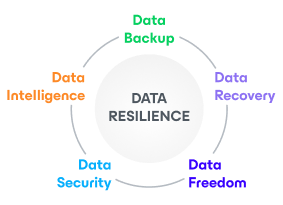In the digital age, where data reigns supreme, businesses face the challenge of safeguarding their most critical asset. As organizations increasingly turn to Salesforce for managing their customer relationships and data, the need for a robust backup strategy is beyond necessary. To keep you informed, let’s delve into the whys and how’s of Salesforce backup, explore best practices to ensure the data’s security, and how to keep the integrity of your business data.
The Crucial Role of Data in Business
To begin, let’s touch on the growing importance of data in business. From customer insights and data-driven marketing to streamlined operations and strategic decision-making, data has become the linchpin for success across industries. At the heart of this data-centric approach is Salesforce, a leading CRM platform that serves as a central hub for managing invaluable customer information.
Salesforce: A Central Hub for Critical Data
Salesforce stands out as a singular source of truth, offering a unified platform for storing, managing, and analyzing key information related to customers, sales, and operations. With its automation capabilities and the ability to provide a 360-degree view of customers, Salesforce empowers businesses to harness the power of their data for strategic insights and improved business outcomes.
The Significance of Salesforce Backup
Given Salesforce’s pivotal role in managing critical data, ensuring the protection of this information is non-negotiable. Unintentional data deletion, data corruption, cybersecurity threats, and compliance requirements underscore the need for a robust backup strategy tailored to the unique characteristics of Salesforce data.
Automated backups are a must:
- With automated backups, you can restore data to a specific point in time, minimizing potential data loss and not using manual intervention.
- Mitigate the risk of human error or manual oversights, and streamline the backup process, freeing up time and resources for essential tasks.
Best Practices for Salesforce Backup
When considering what the best practices are for Salesforce Backup, a few jump out as list toppers:
- Ensure that you have data resilience with separated backups:
- Always maintain a clear separation between primary Salesforce data and backups for effective disaster recovery.
- Resilient data backups aid in compliance with regulatory requirements like GDPR.
- Choose off-site storage for flexibility:
- Leverage cloud-based solutions for scalability and improved accessibility.
- Regularly assess and validate chosen backup storage solutions for data integrity and accessibility during recovery scenarios.
- Never depend on the Recycle Bin:
- Acknowledge the limitations of the Salesforce Recycle Bin, which is not a long-term data protection solution due to its limited retention period and storage constraints.
- Insist on granular restore and recovery:
- Be sure to utilize a backup solution that offers granular restore capabilities for targeted recovery to enhance efficiency and reduce downtime.
- Prioritize the backup of metadata for a comprehensive system restoration.
- Implement a comprehensive backup strategy:
- Focus on elements including data retention, security, and disaster recovery planning.
- Develop a regular backup schedule aligned with data update frequency and business requirements.
- Document and communicate the backup strategy across the organization for awareness and adherence.
- Choosing the right backup solution:
- Evaluate features offered by different providers for comprehensive data and metadata coverage.
- Consider scalability and flexibility in storage options to accommodate evolving data requirements.
Remember to Always Safeguard Your Business Data
Proactive data protection is foundational for business resilience, growth, and long-term success. By implementing a comprehensive Salesforce backup strategy and adhering to best practices, businesses can ensure the security, accessibility, and integrity of their critical data.
Consider solutions like Veeam Backup for Salesforce, a global leader in data protection, offering automated backups, granular recovery, robust security features, and a user-friendly interface. Protect your business data, mitigate risks, and position your organization to leverage data-driven opportunities in the future.
Want to know more? Download our latest white paper – Salesforce Backup Best Practices Guide HERE.
